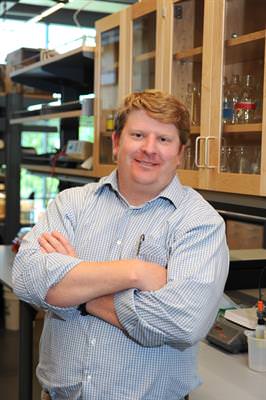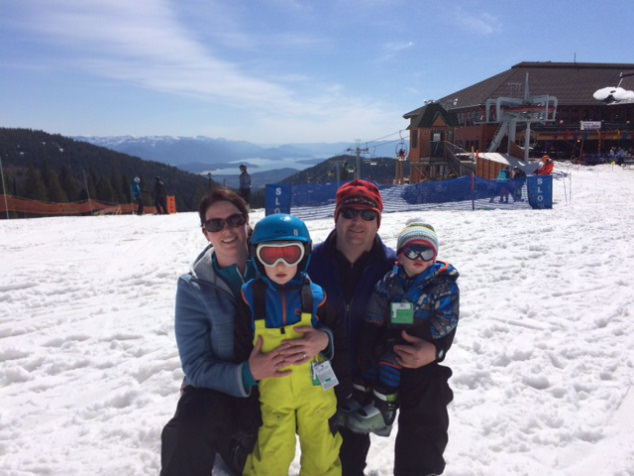We recently spoke with BPS Early Careers Committee Chair Bert Tanner, Washington State University, about his research, his time on the committee, and the years he spent as a gymnast.
 What is your current position & area of research?
What is your current position & area of research?
Assistant Professor, Department of Integrative Physiology and Neuroscience, Washington State University I study muscle biology and teach physiology to undergraduate, graduate, and veterinary students. Research studies within my laboratory focus on normal, mutated, and diseased proteins that influence muscle contraction. We often integrate mathematical modeling, computational simulations, biochemical assays, and biophysical system-analysis to investigate complex network behavior among muscle proteins. We use these findings to describe and illustrate molecular mechanisms of contraction that underlie muscle function at the cellular and tissue levels.
What drew you to a career as a biophysicist?
I studied Physics as an undergraduate student at University of Utah. The last couple years of my undergraduate studies I got the opportunity to further explore bioengineering and computer science, and I participated in a summer research experiences learning about computational biology, remote sensing, and environmental biophysics. Through these experiences, I became increasingly interested at using mathematics, physics, and computation to better understand and describe biological processes. Through a series of injuries, I started learning more about physiology and became increasingly curious about different applications where mathematical modeling could help illustrate complicated, dynamic processes at the molecular, cellular, and organismal levels. This led me back to graduate school, where I ultimately began studying muscle biophysics.
What do you find unique or special about BPS? What have you enjoyed about serving on the Early Careers Committee?
I love the rigor, diversity, and plasticity of the Biophysical Society, as well as the annual Biophysical Society meeting. I’ve been attending and presenting at the national meeting since 2004, and I am really impressed by the high-quality science and constructive engagement of many society members—many of whom have become great friends and colleagues over the years. I also really appreciate the strong commitment to training young scientists in a rigorous, difficult field that is demonstrated by the BPS and its engaged membership. I enjoy being a member of the Early Careers Committee because it is a platform that enables education and programming for early career biophysicists via the newsletters, society webpage and blog posts, and annual meeting events. These early career biophysicists are among the best and the brightest minds in the world, and our committee feels it is critical to help them learn about the myriad career paths where their skills will make an impact: academia, industry, small business, national laboratories, science writing and education, public policy, etc.
Who do you admire and why?
I admire many people from many different walks of life, but I often think most of the people that have impacted my education in a positive way. This includes a handful of teachers from elementary, middle school, and high school, all of whom made a really big impact on my thinking and career choices. Just like the impact these teachers made on me, other teachers work tirelessly to educate students each day; the well-being of our society greatly benefits from their efforts. A second tier of people that I really admire are the approachable, engaging, unselfish, and constructively-critical mentors or colleagues that I get to interact with each year. These people inspire me to try and do my best each day, and to treat people kindly. 
What do you like to do, aside from science?
I love the outdoors and to exercise. When I can pair these two up, it is even better. My favorite hobby is skiing, just being out in the snow and gliding down the mountain, trail, or path is fantastic. The past few years I’ve spent all my spare skiing-time on the ‘magic carpet’ teaching my son how to ski. He is 5 now, and getting pretty good at the ‘blue squares’. On our last ski day in Spring of 2016, my daughter (then about 18 months old) even skied by herself for about 60-100 feet. She loves skiing and spent most of her first couple seasons skiing in a backpack on my back. I cannot wait to watch her keeping up with her big brother soon.
What is your favorite thing about living in Washington?
The diversity of the outdoor activities. My family and I get to live in a small town and I get to work at a Pac-12 university with wonderful colleagues and great resources to pursue my research. However, we are only 30 minutes to 2.5 hours away from world-class white water rivers, camping, hiking, backpacking, and pretty good skiing. This accessibility to nature, and the diversity of options is really special to me and my family.
What is something BPS members would be surprised to learn about you?
I was a gymnast until age 18. I loved it, but it took a lot of time and I decided not to pursue it as a collegiate athlete. However, it was pretty fun watching some of the fellow gymnasts that I’d trained with, and competed against as I grew up, perform in the Olympics over the past 15-16 years.
Do you have a non-science-related recommendation you’d like to share?
The recent Zootopia movie has a classic and wonderfully painful scene with sloths running the DMV. For a quick laugh (2-3 min segment) you should check it out on YouTube.